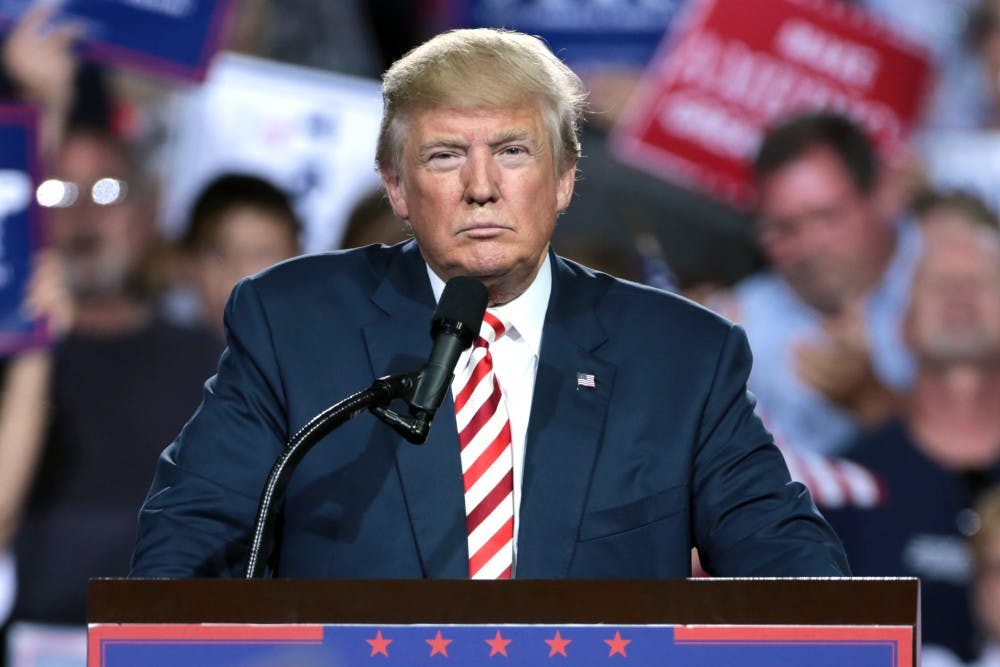President Trump announced on March 2 that he will withhold federal funding for colleges that do not support free speech. Though the Trump administration has not released any further details, University faculty and administration feel confident that the move would not affect the University.
Speaking at the Conservative Political Action Conference (CPAC) in National Harbor, Md., Trump said, “I will be signing an executive order requiring colleges and universities to support free speech if they want federal research dollars.”
Trump’s statement was met with raucous cheers from the attendees, many of whom donned Make America Great Again hats.
Trump’s desire to punish colleges that do not support free speech falls in line with his previous statements. In 2017, Trump tweeted, “If U.C. Berkeley does not allow free speech and practices violence on innocent people with a different point of view - NO FEDERAL FUNDS?”
Professor Keith Whittington, author of this year’s pre-read, “Speak Freely,” was skeptical that Trump’s policy would have substantial impacts on the University.
“I think in practice, it shouldn’t have huge consequences for a place like Princeton because we’re already committed to the relevant principles,” Whittington said.
University spokesperson Ben Chang echoed his confidence in the University’s dedication to free speech in an email to The Daily Princetonian.
“Of course, we remain committed to free speech, on campus and more broadly, a message frequently reinforced by President Eisgruber and demonstrated through this year's Pre-Read and frequent events featuring speakers with many different points of view,” Chang wrote.

Riley Heath ’20, president of the University’s chapter of the conservative activism group, Turning Point USA, agrees that the University does a good job protecting free speech, but noted that there is tension between students of differing opinions.
“I think Princeton as an institution does a good job of protecting free speech here, I would just like the students to be more welcoming,” Heath said.
Moreover, he thinks that free speech is an important issue on college campuses in general.
“There’s a growing threat of violence towards people to try and suppress their speech,” he said.

Outside of the Orange Bubble, Whittington feels that free speech needs to be better protected on college campuses.
“There’s a genuine problem on campus free speech in the country at large,” Whittington said. “Lots of universities do not do nearly as good of a job on this as they should.”
However, Whittington worries that an executive order is not the best way to go about solving the issue.
“Trying to have the federal government be the enforcement mechanism is probably not going to be very helpful, [and] tying it to grants is probably not going to be very helpful. So even to the extent that there are genuine issues to be addressed, I don’t think that this is the right instrument for trying to address those things,” Whittington said.
Heath, though excited by Trump’s acknowledgement of the issue, agreed with Whittington’s assessment.
“It is kind of an overreach of his power,” Heath said. “There should be more of a constitutional way to go about it.”
It is uncertain whether an executive order would target only public institutions or private colleges as well.
Furthermore, Whittington expressed fear that a harsh executive order could lead to unforeseen consequences for the University, such as overly strict regulations.
He said certain iterations of the executive order could “result in the University being overly aggressive in trying to do everything it can to avoid that really bad thing from happening, which leads to its own set of problems.”
Whittington explained that if the executive order is narrow in scope, it could very well be constitutional, but will likely meet resistance in the courts regardless.
“Almost anything he winds up issuing is going to be challenged in court, and so it will take a while before it plays itself out and even a relatively narrow one will wind up getting challenged,” Whittington said.
He suspects a broad version of the order may be unconstitutional.
“You can imagine a lot of things that are much more aggressive and ambitious that would have clear problems, and, presumably, the White House is more likely to go with aggressive and ambitious,” he said.
Whittington concluded that there may be several iterations of the executive order before it is successful.








